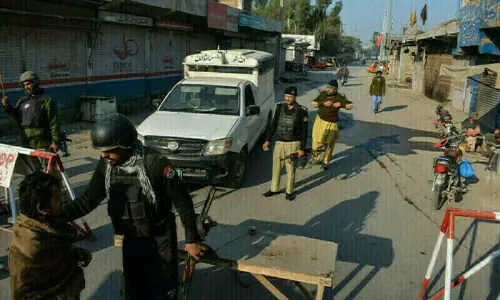PUNJAB Governor Sardar Latif Khosa’s remarks at a press conference a few weeks ago should prod serious reflection and not in Pakistan alone.
He said: “Under the Charter of Democracy it had been agreed that the Supreme Court would provide relief to the masses by hearing other than constitutional-related matters while a federal constitutional court be set up only for constitution-related issues. We are ready to go for another amendment in this regard.”
He was concerned at the enormous backlog that has resulted in gross delays in the disposal of cases. “Some people have been in jail for 20 years but their cases are not being heard. The justice system has totally collapsed which we need to change.”The Charter of Democracy signed in London in 2006 by Benazir Bhutto and Nawaz Sharif is a historic document. Its 36 paragraphs contain accord on a host of matters. Para 4 reads thus:
“A federal constitutional court will be set up to resolve constitutional issues, giving equal representation to each of the federating units, whose members may be judges or persons qualified to be judges of the Supreme Court, constituted for a six-year period. The Supreme and High Courts will hear regular civil and criminal cases. The appointment of judges shall be made in the same manner as for judges of higher judiciary.”
It was Quaid-i-Azam Mohammad Ali Jinnah who not only suggested this at the second roundtable conference in London in 1931 but expounded on its merits with impeccable logic. The proposal must be appreciated in the light of Jinnah’s earlier advocacy of a Supreme Court of India.
One of India’s most distinguished jurists Sir Hari Singh Gaur moved a resolution in the central assembly for the establishment of a Supreme Court of India. Jinnah supported it. In a speech in the assembly on Feb 17, 1925, he alleged that “the Privy Council have on several occasions absolutely murdered Hindu law and slaughtered Mohammadan law”.
The law member of the viceroy’s executive council, Sir Tej Bahadur Sapru, did not support the resolution. Instead, he secured its circulation to elicit public opinion. The high courts were divided and so was the Indian bar. A great judge Sir Shah Mohammad Sulaiman of the Allahabad High Court supported the proposal. No one was surprised at its eventual defeat in the assembly.
Jinnah renewed the proposal in an amplified form at the federal structure sub-committee of the second roundtable conference on Oct 27, 1931. He proposed three courts at the apex of the judicial hierarchy — a federal court on constitutional matters; a supreme court to hear appeals from the high courts on federal laws; and a criminal court of appeal.
In 1949 the basic law of Germany established the federal constitutional court as well as the federal court of justice, the federal administrative court, the federal finance court, the federal labour court and the federal social court. This promotes specialisation and also reduces the workload of a single supreme court.
The federal court, Jinnah emphasised, should not only have jurisdiction over disputes between the federation and the provinces and over disputes among the provinces but its doors should be kept wide open for the citizen if his rights were violated. He explained: “The personnel of the court will be qualified in those constitutional matters as constitutional lawyers, because the question dealt with will arise, as we have contemplated, between the federation and the units and between the units inter se. Further, I maintain, that it should be open to any subject, if his right is invaded or attacked — relating to the constitution, of course, or arising out of the constitution — to go to the federal court direct.”
However, he envisaged also a procedure adopted later in the constitutions of France and Sri Lanka for a reference to the court before the bill is enacted. “If there is any measure which infringes any provision of the constitution — which includes fundamental rights and many other things — if it infringes any provision of the constitution which affects any subject or any community or any class and if an objection is raised, by at least a majority of two-thirds, that it affects their particular right under the constitution, that measure ought to be suspended and within one month that party or a member of the party or community should be entitled to file an action.”
If the courts are thus separated, lawyers who have specialised in that particular branch of the law will be appointed judges. “This is an age of specialisation,” he reminded the members. Yet lawyers handled cases on different subjects ranging from marriage and divorce to contracts, admiralty and easements.
Jinnah also revived his suggestion of 1925. “I cannot understand why India should not aspire to its own supreme court. Why should India be the only exception that is permanently tied down to the Privy Council here? Other dominions have got it. There can, therefore, be no question as to the necessity and as to the justice of this; and accordingly I say that we should have a supreme court.”
Experience has amply vindicated Jinnah. The Law Commission of India proposed some years ago bifurcation of the Supreme Court of India to set up a separate constitutional court. The suggestion was viewed with deep suspicion because of Prime Minister Indira Gandhi’s policy of appointing ‘committed’ persons to the bench.
The Charter of Democracy (2006) embodies a bipartisan accord on a federal constitutional court. If the matter is considered fully in light of Jinnah’s detailed exposition on October 27, 1931, a more nuanced proposal would emerge.
The writer is an author and lawyer based in Mumbai.































